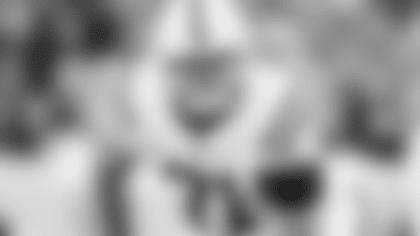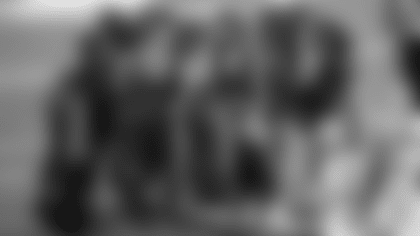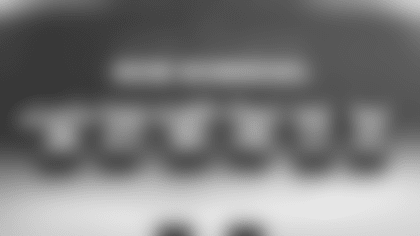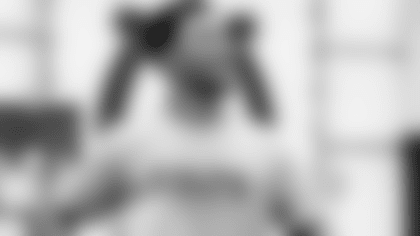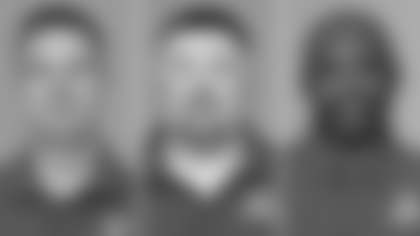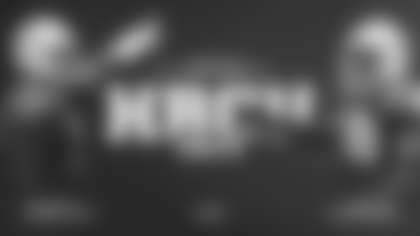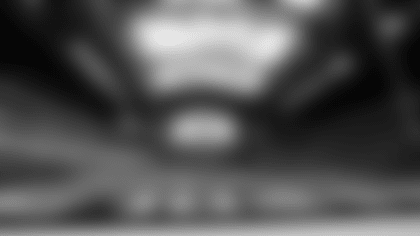INDIANAPOLIS – Wide receiver Reggie Wayne and linebackers Pat Angerer and Kavell Conner hail from three different states – Louisiana, Iowa and Virginia, respectively.
They are part of a brotherhood in Indianapolis by playing for the Colts. They had divergent geographic paths to get to Indianapolis, and all three left the ties of family behind to perform their careers.
Wayne, Angerer and Conner are not the only members of their families to move away to establish a career. They each have relatives who performed greater callings by performing military service.
As the Colts and the National Football League recognize Veterans Day and honor the military with a "Salute to Service," here are stories from three players.
Kavell Conner was born in Richmond, Virginia and was raised there his whole life before attending Clemson University. Conner found a measure of his upbringing in sports, and it was a teamwork setting in football in which he thrived. Conner was a three-year starter at running back and safety at Manchester High School before embarking on his collegiate career.
That he thrived in such a setting can be traced, in part, to his grandfather, Keith Conner. Kavell Conner's mother was young when he was born. To assist in his rearing, Keith became involved, and he was around in such a way that it impacted Kavell greatly.
"He is my mother's father and he had a big hand in raising me. My mom had me at a young age, so he pretty much was my father," said Conner. "Actually, I call him 'Dad.' He was a very disciplined person, and that showed up in how he helped raise us. He raised us in a firm way. It was very important for us to be on time and be on top of the small things. He was very big on me making the bed in my room on a daily basis. I look back on how he treated us firmly, and in a loving way, and I am grateful he was around to play a role in my life."
Keith was raised in Richmond, too. He was not able to go to college, so he entered the military right out of high school. It has been a path that defined the next quarter century of his life.
"It's something he definitely wanted to do when he was growing up," said Kavell. "I think there weren't too many options for him growing up then. I think he saw himself making his way through the military. He wanted to help his country out any way possible, so he went into service right out of high school. My grandfather has served in the Army Reserves for 24 years. He was stationed in Louisiana for two years, but he served most of his military time in Charlottesville. He was deployed to Iraq for two or three years. He's kind of enclosed on the topic. He does not really talk about it much, so I give him some room. I don't bring it up much since he likes to keep it to himself.
"I think for the guys in the family, his military service gave us a great example of discipline. I think it affected how he interacted with the family, and it was all for the good. I am better off as an adult for the way he spent time raising me. I know many of the principles he used came straight from his training."
Kavell Conner sees the regimentation of the NFL and how everything is accomplished with teamwork, dedication, single-mindedness and sacrifice. While Conner performs these in a sport, he knows his grandfather did the same, but the stakes for his grandfather were incredibly higher and the honor was far greater.
"I see the parallels with military service and with football because of the amount of teamwork involved," said Conner. You have to be accountable in everything you do because it impacts everyone else. That is the way it is in the service, too, and the importance is much greater than it is in playing a sport. You have to do your job because the person next to you depends on it, and the consequences in the service always are much greater. I definitely have a great deal of respect for people in the military. Not everyone is excited to go do those jobs. For someone to put their life on the line to save people like me, like regular civilians, it's something you truly respect. You have to have a deep respect for everyone in those positions because of the sacrifices service people make to protect our country."
Pat Angerer grew up as the youngest of five children. His brother, Nate, is a few years older than Pat to the degree that he served as a mentor as well. Nate joined the Marines after high school and started a distinguished career that included service in Somalia. Pat had specific designs to follow his older brother into service. Football, however, interrupted and diverted Angerer's career path. Nate's service influences his younger brother to this day.
"My brother is a big role model to me," said Angerer. "He stood up and fought for what he believed it, and it was pretty good to look up to somebody like that. I don't know if he always planned to go into the service, but he went in just after high school. He ended up fighting in Somalia. It was cool, you always had someone to look up to. It was always cool when he would fly home and you would go meet him at the airport. I knew he was going to be safe. He is an unbelievable person, a great soldier, a great father, a great brother – a real warrior, all around. He was a mentor, someone I looked up to, and what a great example he is. He always stood up and fought for what he believed in, and he did everything right."
Angerer, like Conner, excels in football but stops way short of thinking football compares with military service and the honor of serving.
"I wouldn't want to demean what he did by talking about football being similar to war," said Angerer. "It's really not at all. I don't think it's that similar. The relationships you make here (with the Colts) are tight, but there's no way they're as tight as somebody who is laying it all on the line for you.
"We have it pretty good in this country. I really haven't done anything for it (the country). I always respected the men and women who fought for our freedoms, especially for freedoms we take advantage of each day. I can go to sleep at night without worries because there are men and women putting it on the line for my family and me. These people are fighting selflessly for those freedoms, and we should recognize that and honor them every chance we get."
Reggie Wayne's first cousin, Jamie, is four years older than the five-time Pro Bowl wide receiver. There is no doubt who the true family hero is in this two-person equation. Reggie will defer to his 37-year old cousin, who knew early in life he wanted to pursue a career of military service and who served in Iraq.
"Jamie is from Donaldsonville and went straight to West Point from high school," said Wayne. "From day one, he wanted a life of military service. That's why he went to West Point. He thought highly of his country. It was his vision as a kid to make America a better place. This is his calling. I don't see him doing anything else. He has been doing it for about 19 years."
Jamie Wayne eventually earned a degree from West Point in life sciences. He earned a doctorate in medicine from Tulane University. North Carolina and Texas were among his stateside assignments, but his career eventually took him to a foreign land. The deployment made it tough for Reggie and Jamie to keep up, but the cousins found a way.
"Earlier in my career when he was in Iraq and I was here (in the Colts facility) we would email," said Wayne. "It was morning here and nighttime there and one day a story he emailed put things in perspective. Jamie was on patrol and a vehicle he was in passed through a checkpoint that moments later was ambushed. While he safe, a soldier was killed, and it underscored to me the peril soldiers live in daily. His email described the incident and it really lit everything up for me, knowing how much danger he and all the troops were in over there.
"I just sit back and think those are the true heroes. What we (NFL players) do, little kids want to be football, basketball or baseball players. The true heroes are those military men and women who are risking their lives every day to make this country a better place. You can't do anything but tip you hats to them. They are the ideal Americans. At every opportunity they should get what they deserve, and that's our unending respect and admiration. I can't express how much I appreciate what they do. People don't think of the freedoms they enjoy every day because of our military personnel. It's so easy for Americans to take things for granted, the lives and luxuries we have. We roam around freely because of these true heroes."
Wayne was a part of the Colts contingent that visited the Walter Reed Army Medical Center in Washington, DC on April 23, 2007, before the team visited the White House after winning Super Bowl XLI. The team's players and coaches encountered numerous service members who were wounded badly in battle. The poignant visit left everyone affected, Wayne included, and it further distinguished the heroism involved in military service.
"The visit made me think football is just a game," said Wayne. "Win, lose or draw, you go home. You see your family, rest and entertain yourself. You will continue to do normal things. You look at those injured soldiers, and they're the ones who really put it on the line. We think about game day kind of as our 'Judgment Day.' In all honesty, it's not, it's just a day. Those veterans, their 'Judgment Day' can cost them their lives. It (the visit) put everything in perspective. You don't take anything for granted. I can't tell you how many soldiers I told that day, 'Thank you.' I knew they laid it on the line. It made me stop using the football term, 'going to war.' I stopped using that term after seeing those heroes. What some of my teammates and I left with that we remembered the most, and we talked about it many times after that, was that all these soldiers, no matter how badly they were hurt, they all wanted to get back to their buddies. These heroes were crying to go back. Their sense of duty was so great.
"You can't help but be deeply affected by that. We should honor our military personnel every day and thank them for the lives and freedoms they provide us through their service.




